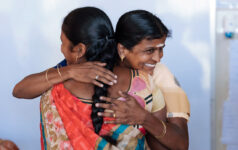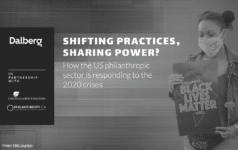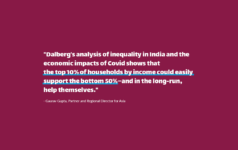Dalberg uses cookies and related technologies to improve the way the site functions. A cookie is a text file that is stored on your device. We use these text files for functionality such as to analyze our traffic or to personalize content. You can easily control how we use cookies on your device by adjusting the settings below, and you may also change those settings at any time by visiting our privacy policy page.
For more than three years, in partnership with clients including the Bill & Melinda Gates Foundation, Dalberg has been researching the topic of women’s unpaid care work – the everyday household chores and tasks that include looking after children, attending to the elderly, cooking, cleaning, and more.
We’ve built a database that tracks time use across more than 75 countries, conducted a literature review of over 100 articles and reports and interviewed over 60 experts. What we’ve learned is this: over a lifetime, women spend 7 years more than men on unpaid care work. And while the ratio of how much work is done by women vs. men varies widely – from 1.5x more unpaid care work done by women in Norway and Canada, to more than 10x in Pakistan – in no country is this work equally distributed between men and women.
So what is the impact of this heavy and unequal split of unpaid care work? Women and girls’ potential is limited, economic empowerment is affected, and earning potential is reduced, among many other negative outcomes.
In this summary of Dalberg’s deep dive into the topic of unpaid care work we capture our learnings from our three-year, around-the-globe analysis of the issue, including how women and girls’ lives are affected in the short- and long-term, as well as the impact of the unequal distribution of unpaid care work on communities and economies. We also introduce four interrelated root causes that require a closer look when addressing mismatched unpaid care work responsibilities.
Most importantly, we share our perspective on how to address this issue, drawn from over 30 potential approaches. Spanning from increased affordable care services to technological and design innovations that reduce drudgery, we present the key levers that we believe can create the most impact when addressing the heavy and unequal responsibilities of unpaid care work by women and girls.
Read PDF here.

















